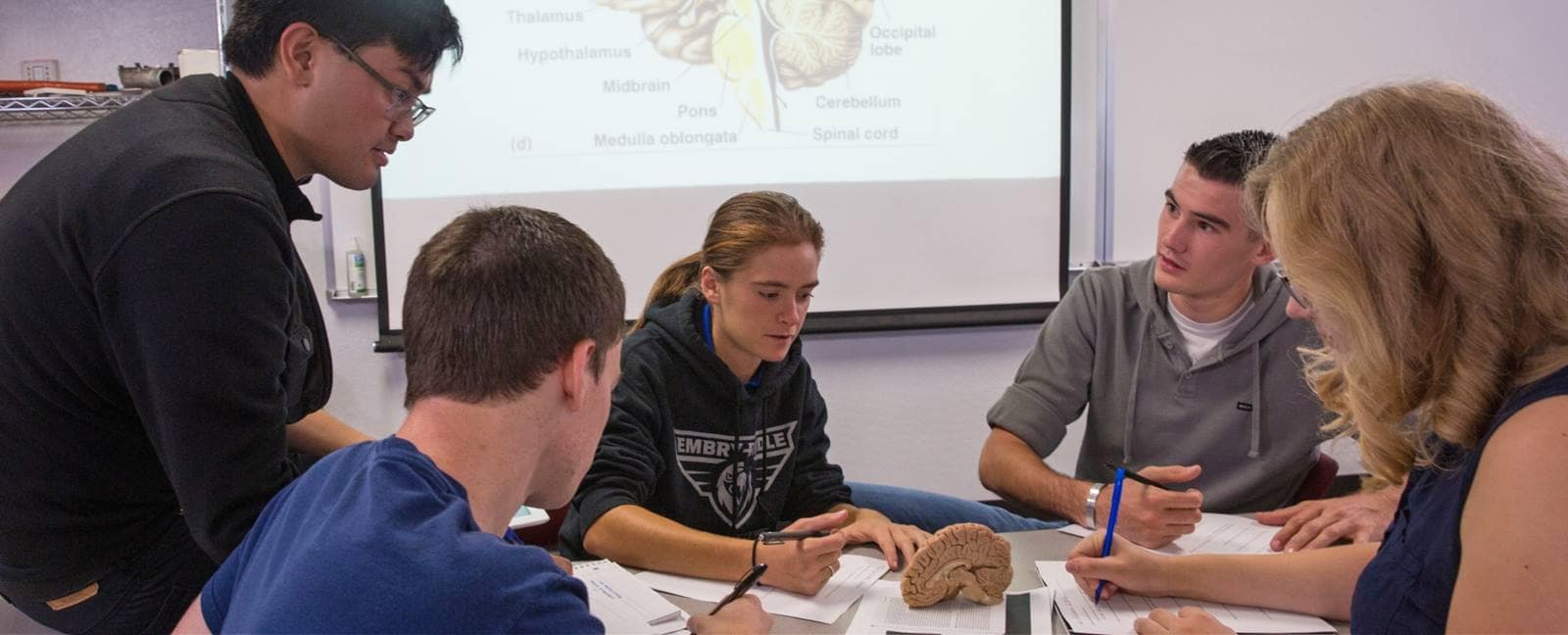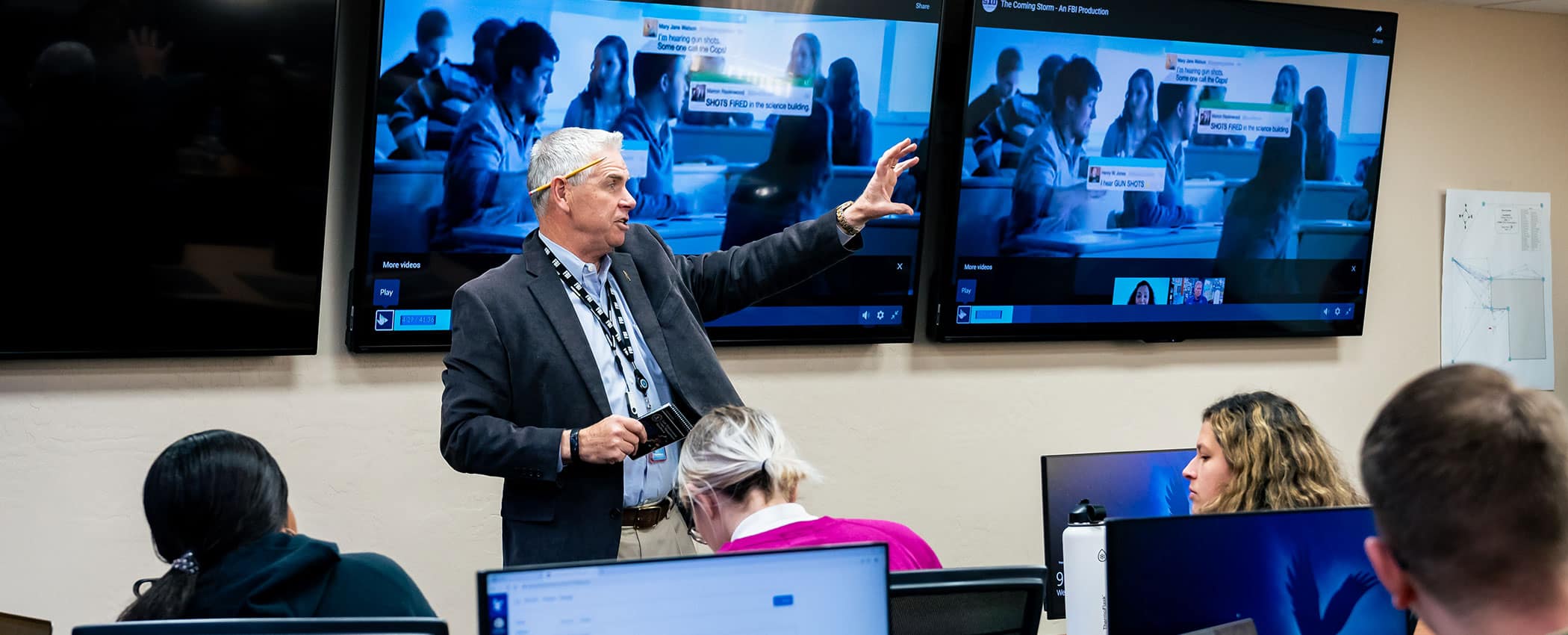
Bachelor of Science in
Industrial/Organizational Psychology
Students work side-by-side with faculty and peers on research projects and industry collaborations that prepare them for careers in the psychology work environment.
No matter what industry or location around the world, there is a critical need to understand human behaviors within the workplace. Industrial-organizational psychology (also called work or business psychology and industrial engineering) helps companies succeed by improving the performance, health and safety of organizations and their employees.
At Embry-Riddle Aeronautical University, the Bachelor of Science in Industrial-Organizational (I-O) Psychology builds future leaders and scholars who work in every industry at every level, creating science for a smarter workplace.
With the wide range of industries (including aviation) that graduates in this field can choose to enter, it’s no wonder why U.S. News & World Report has ranked I-O psychology as one of the best science jobs in the nation today. The Department of Homeland Security has also designated I-O psychology as a STEM degree program.
What is I-O psychology? Real-world practices include:
- Organizational change and development
- Performance management and motivation
- Employee and leadership selection, development and training
- Workplace design
- Team processes
- Health, safety and well-being
I-O psychologists study a wide variety of topics, including motivation and training, group performance and effectiveness, occupational stress, employee selection and assessment, industry-specific concerns, organizational behavior and more.
DETAILS
About Industrial/Organizational Psychology at the Prescott, AZ Campus
The Bachelor of Science in Industrial-Organizational Psychology degree on the Prescott Campus prioritizes three key areas of instruction: faculty expertise, student opportunities and the intersection of science and practice.
Our psychology faculty are experts in their fields and work side-by-side with students on research projects and industry collaborations. They share recent research findings and industry concerns with their students, preparing them for careers in the current I-O psychology work environment.
I-O psychology students are fully involved in the program from day one. Throughout their studies, they can join Psych Club or Psi Chi (honor society), present at scientific conferences, pursue internships, work on consulting projects with companies or conduct experiments alongside our faculty.
Embry-Riddle’s I-O psychology program is a hands-on learning and networking degree that puts students in a position to succeed after graduating making an immediate impact on improving the performance and well-being of an organization and its members.
Embry-Riddle students can join a variety of professional groups, such as the Society for Industrial and Organizational Psychology, the American Psychological Association, the Human Factors and Ergonomics Society, the International Society for Air Safety Investigators and the Association for Aviation Psychology, to name a few.
Both the Bureau of Labor Statistics and U.S. News and World Report have named I-O psychology as a top growth field for future professionals. The training provided in the I-O psychology program prepares students to pursue graduate study or immediately enter the workforce upon graduating.
In fact, Embry-Riddle has a 96% placement rate in either employment or continued education within one year of graduation.
I-O Psychology graduates have gone straight into the industry in positions such as:
- Training and development specialists
- Talent recruiters and developers
- Human resources generalists
- Health and safety engineers
- Design engineers
- Consultants
- Research associates
Student Learning Outcomes
Students will:
- Assess leadership skills, employee health, safety, and well-being, and performance within organizational contexts.
- Communicate research findings and psychological insights effectively to diverse audiences.
- Apply professional and ethical practices and legal regulations to industry.
- Conduct empirical research within the field of industrial-organizational psychology.
- Evaluate psychological principles and evidence-based practices in the design and execution of personnel selection and training programs.
- Apply human factors principles to optimize workplace environments and systems.
Degree Requirements
The successful completion of the Bachelor of Science in Industrial-Organizational Psychology requires a minimum of 121 credit hours. Students will complete a general education core, a math and science core, and a Psychological Science core. Completion of a minor is strongly recommended but not required.
Program Requirements
General Education
Embry-Riddle degree programs require students to complete a minimum of 36 hours of General Education coursework. For a full description of Embry-Riddle General Education guidelines, please see the General Education section of this catalog.
Students may choose other classes outside of their requirements, but doing so can result in the student having to complete more than the degree's 121 credit hours. This will result in additional time and cost to the student.
| Communication Theory and Skills | 9 | |
| Computer Science or Information Technology | 3 | |
| Mathematics | 6 | |
| Physical and Life Sciences (Natural Sciences) | 6 | |
| Humanities or Social Sciences | 12 | |
3 hours of lower-level Humanities | ||
3 hours of lower-level Social Science | ||
3 hours of lower-level or upper-level Humanities or Social Science | ||
3 hours of upper-level Humanities or Social Science | ||
| Total Credits | 36 | |
Industrial/Organizational Psychology Core (96 Credits)
The following course of study outlines the quickest and most cost-efficient route for students to earn their B.S. in Industrial/Organizational Psychology. Students are encouraged to follow the course of study to ensure they complete all program required courses and their prerequisites within four years.
Courses in the core with a # will satisfy general education requirements.
| BA 201 | Principles of Management | 3 |
| BA 222 | Business Analytics Tools | 3 |
| BA 319 | Managerial and Organizational Behavior | 3 |
| BIO 120 & 120L | Foundations of Biology I and Foundations of Biology I Laboratory # | 4 |
| COM 122 | English Composition # | 3 |
| General Education - Communications Elective # | 6 | |
| General Education - Computer Science or Information Technology Elective # | 3 | |
| General Education - lower-level Humanities # | 3 | |
| General Education - lower-level or upper-level Humanities or Social Science # | 3 | |
| General Education - upper-level Humanities or Social Science # | 3 | |
| General Education - Mathematics Elective # | 6 | |
| General Education - Physical and Life Science (Natural Science) # | 2 | |
| HF 300 | Human Factors I: Principles and Fundamentals | 3 |
| HF 306 | Human Factors III: Performance Processes | 4 |
| PSY 101 | Introduction to Psychology # | 3 |
| PSY 103 | Professional Development in Psychology | 1 |
| PSY 222 | Introduction to Industrial/Organizational Psychology | 3 |
| PSY 226 | Statistics for Organizational Analysis and Research ^ | 3 |
| PSY 315 | Cognitive Psychology | 3 |
| PSY 320 | Aviation Psychology | 3 |
| PSY 322 | Research Design ^ | 4 |
| PSY 335 | Physiological Psychology | 3 |
| PSY 345 | Training and Development | 3 |
| PSY 350 | Social Psychology | 3 |
| PSY 365 | Abnormal Psychology | 3 |
| PSY 370 | Occupational Health & Performance | 3 |
| PSY 401 | Psychology of Leadership | 3 |
| PSY 410 | Personnel Selection and Assessment | 3 |
| PSY 494 | Tests and Measurements Theory | 3 |
| PSY 496 | Capstone in Psychology | 3 |
| Total Credits | 96 | |
Minor/Open Electives (25 Credits)
| Minor/Open Electives | 25 | |
| Total Credits | 121 | |
Notes: Open elective credits required will be calculated, based upon selection of the minor, to complete the minimum of 121 credits requirement for the degree.
All Army ROTC students are required to complete SS 321 - U.S. Military History 1900-Present (3 credits) in order to commission.
UNIV 101 meets open elective or credit in excess of degree requirements.
- #
General Education Courses
- ^
PSY 226 and PSY 322 are rigorous, foundational courses in the field of psychological sciences. Therefore, both must be taken at ERAU to ensure students receive the highest quality of instruction, as well as benefit from the university's unique academic resources.
Suggested Plan of Study
| Freshman Year | ||
|---|---|---|
| Fall | Credits | |
| COM 122 | English Composition | 3 |
| Computer Science/Information Technology Elective | 3 | |
| Mathematics Elective | 3 | |
| Open Elective | 3 | |
| PSY 101 | Introduction to Psychology | 3 |
| UNIV 101 | College Success | (1) |
| Credits Subtotal | 15.0 | |
| Spring | ||
| BIO 120 & 120L |
Foundations of Biology I | 4 |
| Humanities Lower-Level Elective | 3 | |
| Mathematics Elective | 3 | |
| Open Elective | 4 | |
| PSY 103 | Professional Development in Psychology | 1 |
| PSY 320 | Aviation Psychology | 3 |
| Credits Subtotal | 18.0 | |
| Sophomore Year | ||
| Fall | ||
| BA 222 | Business Analytics Tools | 3 |
| Communications Elective | 3 | |
| HF 300 | Human Factors I: Principles and Fundamentals | 3 |
| PSY 222 | Introduction to Industrial/Organizational Psychology | 3 |
| PSY 315 | Cognitive Psychology | 3 |
| Credits Subtotal | 15.0 | |
| Spring | ||
| BA 201 | Principles of Management | 3 |
| Communications Elective | 3 | |
| Natural Science Elective | 2 | |
| Open Elective | 3 | |
| PSY 226 | Statistics for Organizational Analysis and Research | 3 |
| Credits Subtotal | 14.0 | |
| Junior Year | ||
| Fall | ||
| HF 306 | Human Factors III: Performance Processes | 4 |
| PSY 322 | Research Design | 4 |
| PSY 335 | Physiological Psychology | 3 |
| PSY 365 | Abnormal Psychology | 3 |
| PSY 401 | Psychology of Leadership | 3 |
or PSY 345
|
Training and Development | |
| Credits Subtotal | 17.0 | |
| Spring | ||
| Humanities or Social Science Upper-Level Elective | 3 | |
| Open Elective | 3 | |
| Open Elective | 3 | |
| PSY 350 | Social Psychology | 3 |
| PSY 370 | Occupational Health & Performance | 3 |
or PSY 410
|
Personnel Selection and Assessment | |
| Credits Subtotal | 15.0 | |
| Senior Year | ||
| Fall | ||
| BA 319 | Managerial and Organizational Behavior | 3 |
| PSY 401 | Psychology of Leadership | 3 |
or PSY 345
|
Training and Development | |
| PSY 494 | Tests and Measurements Theory | 3 |
| PSY 496 | Capstone in Psychology | 3 |
| Credits Subtotal | 12.0 | |
| Spring | ||
| Humanities or Social Science Upper-Level Elective | 3 | |
| Open Elective | 3 | |
| Open Elective | 3 | |
| Open Elective | 3 | |
| PSY 370 | Occupational Health & Performance | 3 |
or PSY 410
|
Personnel Selection and Assessment | |
| Credits Subtotal | 15.0 | |
| Credits Total: | 121.0 | |
Get Started Now:
Summary
120 Credits
Estimate your tuition by using the Tuition Calculator
View Financial Aid Information
Learn about our General Education
Find out about transferring credits to this degree
Learn more about our Veterans & Military benefits
View our Academic Calendar


